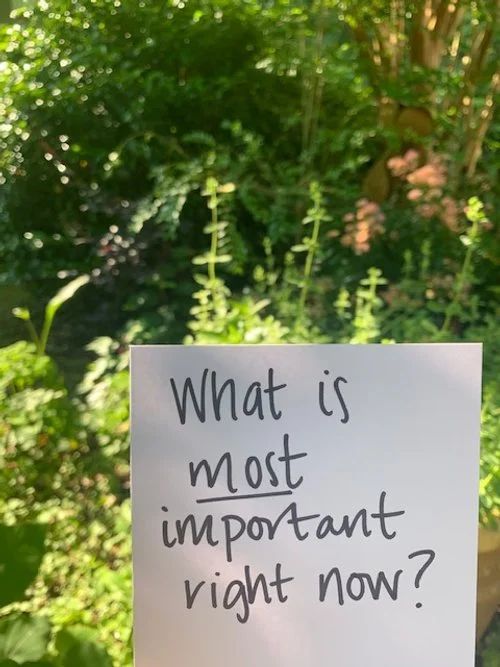Prioritizing and Debunking the Myth of Infinite Capacity
Energy Conservation for Humans, Part 2
You cannot do it all.
Obvious? Perhaps. But how many times have you acted like you could do it all and been upset when you felt like you were failing?
That’s because somewhere deep within, most of us believe that doing it all is achievable and somehow connected to our worth.
I’ll call this the Myth of Infinite Capacity.
Writer, teacher, and advocate Rebekah Taussig names one pervasive, cultural manifestation of this myth: the “Full-Time Working Adult system.” She observes that this ableist standard does harm to so many people, including:
[B]odies in pain, bodies swaddled in depression and anxiety, bodies that get pregnant, need to breastfeed, have periods, get cramps and headaches, bodies that move and process slower than others…
(Sitting Pretty, p. 132)
If you've been around me for a while, you know that I always seem to come back to the topic of energy conservation. That's because it is so much more than a set of prescribed rules, which if followed carefully will guarantee you never experience a flare, fall, or day when everything seems to go to hell in a handbasket.
As I explored in my last post, I believe that energy conservation asks us to take a close look at how ableism doesn't allow room for humans to have human experiences and how we can make different choices in our own lives.
Once you allow yourself the space and the grace to be human, there are some powerful ways you can bring more balance, joy, and ease into your daily life.
Energy conservation is a lifestyle approach and often requires intentional mindset shifts. Here are the 5 foundational principles I share when I’m working with clients navigating chronic health issues or big life transitions:
1. Decide your priorities.
Some of our bodies and brains reveal the limits of being human more quickly or obviously than others, but they are real for us all. Especially on hard days or in more challenging seasons, we are forced to be more discerning with how we use our physical, mental, and emotional energies.
Prioritizing means saying “No” to some things so that you can say “Yes” to what is most important. Given the reality of what’s happening in your body and life, how will you spend your energy and time?
Grab your journal (or a scrap piece of paper) and answer these questions honestly:
What are the non-negotiables that must happen today?
What would have the greatest positive impact on your reality?
What can be set aside?
ACTION STEPS:
2. Pace yourself.
It can be so tempting to push through, to just get it done. However, “pushing through” can be incredibly harmful to body, mind, and spirit. It can lead to significant fatigue and exacerbation of other physical symptoms, like pain and spasms.
Have you ever felt like you’re spinning your wheels? Or that when you’re already tired, simple tasks take much longer to accomplish?
As energy dwindles, our cognitive flexibility becomes more limited, so problems that would otherwise feel manageable become overwhelming. Our ability to regulate emotions also gets much harder, so we can become more self-critical and reactive towards others.
How can you break out of this debilitating, frustrating, unproductive cycle?
Look at your to-do list: How much physical and/or cognitive energy will each task take? You can rank them each using either a 1-5 scale or simply low-medium-high.
Plan your day trying to switch between high-energy and low-energy activities. This can really improve task efficiency and quality – AND it reduces unnecessary stress!
ACTION STEPS:
3. Take real rest breaks.
The strategy of pacing only works if the rest breaks you take are actually restful. Truly restful activities are those that refresh, restore, allow you to relax and feel supported.
It’s not cheating. You aren’t lazy. Your brain and body need time to recharge. (Please quote me and repeat this aloud as many times as necessary!)
Close your eyes.
Take a few mindful breaths.
Go outside (or bring nature to you).
Follow a guided meditation.
Put on your favorite music.
…the possibilities are endless!
ACTION STEPS:
4. Delegate what you can.
This is incredibly challenging in a culture that prizes (glorifies?) self-sufficiency. Even the profession of occupational therapy emphasizes individual independence to a degree that I’m sometimes uncomfortable with.
You are human and we are inherently interdependent beings. We need each other. Sometimes we can pretend that isn’t true, but big life transitions, chronic health issues, and just the daily challenges of being human shatter that illusion at some point.
It is okay to ask for help.
Let people who are already on your team know how they can help. Get specific!
Consider roles you could hand off to others (for a season or indefinitely) to make your life easier. Is it:
Getting groceries delivered?
Outsourcing time-intensive work projects?
Having someone watch the kids?
ACTION STEPS:
5. Manage expectations.
Even with excellent prioritizing and planning, life still happens – especially when you’re living with chronic illness. Symptoms flare, new medication side effects pop up, energy gets zapped way before the day is done.
It can be really hard to acknowledge and accept the things that aren’t going as we hoped or expected. However, focusing on the infuriating gap between our expectations and reality can intensify the distress. Guess what we have control over? Yep. I know. Why can’t reality just pull it together and get on board with our plans??
Alas, the most effective way to reduce feelings of distress is by adjusting expectations. Perhaps that means creating wider margins for time frames (for example, “I’ll finish this sometime before Thursday” instead of “I’ll do this at 3pm today”) or more lenient standards for a task (for example, “I want to fit in some physical exercise at least 3 days this week” instead of “I am going to run 5 miles every day”).
This is where rooting back into what matters most can support you in meeting the moment with more kindness and ease.
Set generous goals based on your priorities and core values.
Practice releasing with kindness anything left undone.
Let today be what it is. Remember, you are enough.
ACTION STEPS:
It’s true: you cannot do it all. And that’s okay and beautiful because you are human! What if we all agreed that the Myth of Infinite Capacity is an impossible, ridiculous, and harmful standard? Imagine how much stress and shame we could release individually and collectively.
You can choose what is important and what doesn’t matter as much right now (the second part is key!). The principles of energy conservation can support you in making empowered choices from an honest, self-compassionate place where there is room to listen to your own life and body speaking.












